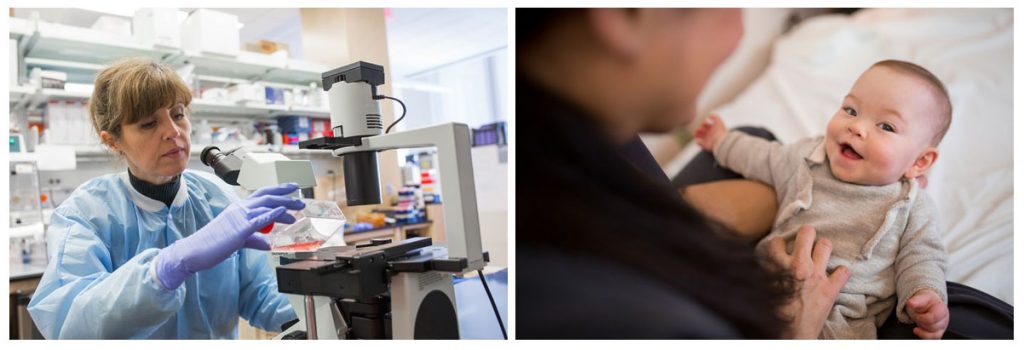Pediatric Physician Scientist Training Program

About the Program
The UNC School of Medicine’s Department of Pediatrics is committed to the development of future generations of leading physician-scientists who will continue to advance progress across the spectrum of children’s health.
The UNC Pediatric Physician Scientist Training Program (P-PSTP) supports selected pediatric residents through individualized mentorship building upon the clinical training provided through a typical residency program. The program is open to pediatric residents with MD, DO, MD/PhD, MD/MPH or MD/MS degrees with significant prior research who are committed to specialty fellowship and future engagement with research.
The UNC PSTP is supported by our clinical divisions and our pediatric residency programs. Further, the P-PSTP facilitates engagement of residents with programs across the UNC School of Medicine including the NC TraCS Clinical and Translational Institute, the Marsico Lung Institute, the Cecil G. Sheps Center for Health Services Research, the Lineberger Comprehensive Cancer Center, and the UNC Children’s Research Institute.
P-PSTP residents also can engage in research projects and strategic initiatives with other Schools across the University, including the Eshelman School of Pharmacy, the Gillings School of Global Public Health, the College of Arts and Sciences, and the UNC School of Social Work. Dedicated faculty members within the Department of Pediatrics and across the campus are available to mentor developing physician-scientists focused on child health.
Residents in the P-PSTP have the opportunity to interact with pediatric fellowship programs, including specialized fellowship talks and programmatic seminars held throughout the year. To learn more about our fellowship programs, click here. To learn more about the Carolina Child Health Scholars Program, a physician scientist training program intended for physicians in fellowships or sub-specialty residency programs, click here.
I chose UNC because of the warm and welcoming environment I experienced on interview day from residents and faculty. I was also blown away by the incredible amount of research opportunities available. The PTSP program has made it easy for me to remain engaged in research throughout the year by setting me up with wonderful mentors and tailoring my schedule to allow for conference attendance and scholarly work. –Isabelle Dagher, PSTP Resident
Curriculum
P-PSTP residents receive individual mentorship to guide and foster academic career development during training. Each trainee brings unique professional goals and interests, and the program is tailored to meet these needs. Research-focused mentors are assigned during the first year of fellowship to help guide PSTP residents towards suitable research experiences. Significant dedicated research time is incorporated into the residency schedule, with flexibility in overall clinical scheduling. P-PSTP residents may participate in the American Board of Pediatrics Accelerated Research Pathway or the Integrated Research Pathway upon discussion with Residency Directors and approval from the American Board of Pediatrics.
P-PSTP trainees will be exposed to the various types of research at UNC and around the country through seminar series, journal clubs, and other venues. Special opportunities to participate in ongoing research will be provided to stimulate the formulation of their own research programs. P-PSTP residents can take advantage of a wealth of research opportunities across the University of North Carolina campus and a remarkably collaborative environment that fosters trans-disciplinary projects.
Residents are encouraged to attend regional and national conferences that are relevant to their interests. PSTP residents receive travel stipends to attend pediatric research meetings such as the Pediatric Academic Societies Meeting, North Carolina Pediatric Society, and the Society for Pediatric Research. These funds can also cover travel to specialized conferences relevant to subspecialty interests, such as Pediatric Infectious Diseases Society IDWeek, American Association for Cancer Research, the American Thoracic Society, or the American Academy of Allergy, Asthma and Immunology.
I first came to UNC for an away rotation in Pediatrics during my fourth year of medical school and immediately knew this was the place for me. I have become somewhat of a UNC “lifer” now, having stayed through residency and fellowship and now moving into my third year on faculty in Pediatric Infectious Diseases. The collegial environment is unbeatable, both in clinical and research settings, and allows for cross-cutting research collaborations. –Peyton Thompson, Assistant Professor of Pediatrics
Schedule
P-PSTP residents receive clinical exposure similar to categorical residents including inpatient and outpatient rotations at UNC Children’s (Chapel Hill), Cone Health (Greensboro), and WakeMed (Raleigh). Ample time is available for subspecialty exposure throughout training. Dedicated research time can be distributed across each of the years of residency based on residents’ interests and timing. A possible schedule for a three-year residency is listed below.

How to Apply
Our Program participates in the NRMP and accepts applications through ERAS. Deadline for application is November 1st. In addition to the ERAS application, anyone interested in the P-PSTP may complete this Qualtrics form.
Contact
Misty Good, MD, MS
Co-Director, Pediatric Physician Scientist Training Program
Email
Corinne Keet, MD, PhD
Co-Director, Pediatric Physician Scientist Training Program
Email
Meg Kihlstrom, MD
Director, Pediatric Residency Program
Email
Kelly Lear
Coordinator, Pediatric Residency Training Program
Email
Kate Matthews
Coordinator, Pediatric Physician Scientist Training Program
Email